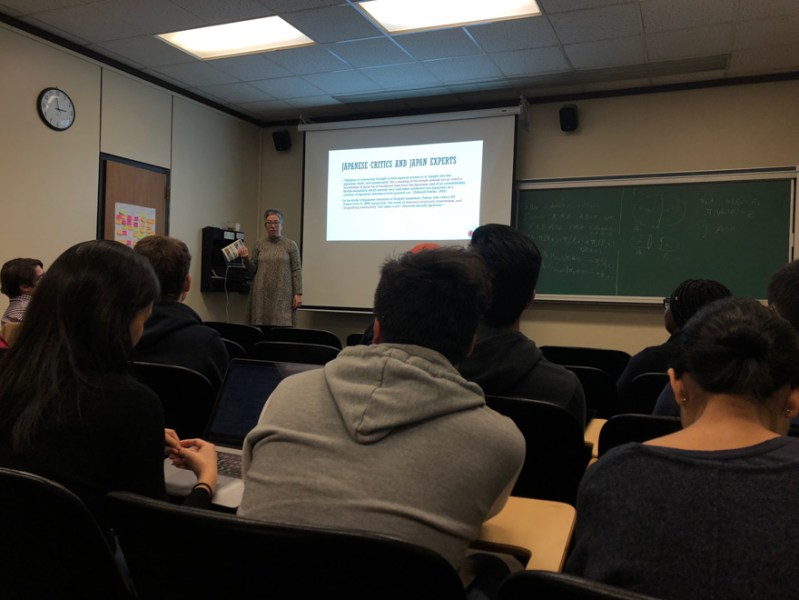Students use Japanese literary works to analyze the relationship between language and translation in JAPAN 121: “Translating Japan, Translating the West,” taught by Indra Levy.
“Once we start thinking about translation, we realize that all the things that we think we know are based on [translation] that we haven’t really scrutinized to the degree that it merits,” said Levy, who also directs the Translation Studies minor. The course is required for the minor.
In the “Translating Japan” portion of JAPAN 121, students approach translation from the English language perspective.
“In the first part we look at concepts and practices of translation within the English context, just thinking only in English, taking for granted that … how we think about translation is really specifically tied to the English language,” Levy said.
In the second part, “Translating the West,” they look at how translation developed in Japan and influenced its society and literature, in addition to how this change in context can overturn previous assumptions about translation.
“My favorite thing about teaching this class is the second half, when students suddenly realize that everything they took for granted about translation when they were only thinking in English could be turned over, and they see a completely different set of possibilities,” Levy said.
Both portions of the course explore “translation as an aesthetic, cultural, and ethical practice.”
Class participant Joseph Noh ’20 said that, as a Korean-speaker who has studied Chinese, translation has always been a part of his life, but this course has given him a new perspective on it.
“It … sparked me to want to learn more about this properly and have this context of translation,” Noh said. “The fact that [economic, social and political] implications exist sets a different vibe from when you’re just learning any [single language].”
Throughout the course, students examine a wide variety of works, including novels, poetry, short stories, Nobel Prize speeches and even the Japanese constitution, which was originally written in English.
“I realized that a lot of the things that I was taught were Japanese had foreign derivations,” Levy said. “Once I came to that realization, [I thought,] ‘How can I bring this revelation to the classroom without the students having to know the Japanese language?’”
To share her revelation about the intimacy of language and translation without requiring students know highly advanced Japanese, Levy developed many of the English materials herself.
She also addresses this reliance on English in her class. Levy said the hegemonic nature of English causes an imbalance in the intellectual exchange facilitated by translation, as English is the language least often translated into but frequently translated out of. She also discussed its resistance to change.
“There are more and more of us who are becoming aware of how important it is for translation to be transformative [of language], and there’s a possibility that translation can bring the foreign into a language in a way that changes it for the better,” Levy said.
She hopes JAPAN 121 will help students develop a critical awareness of translation and its broader implications. She added that, given translation’s importance as an essential part of our perception of the world, it is problematic that we have not developed critical thinking skills in how to evaluate different translations.
“It’s kind of amazing that we don’t think about translation more than we do, because we’re completely dependent on it,” Levy said. “Unless a person can understand every language and access everything in the original language, he or she is going to be dependent on translation for learning.”
Contact Emily Wan at emilywan ‘at’ stanford.edu.
